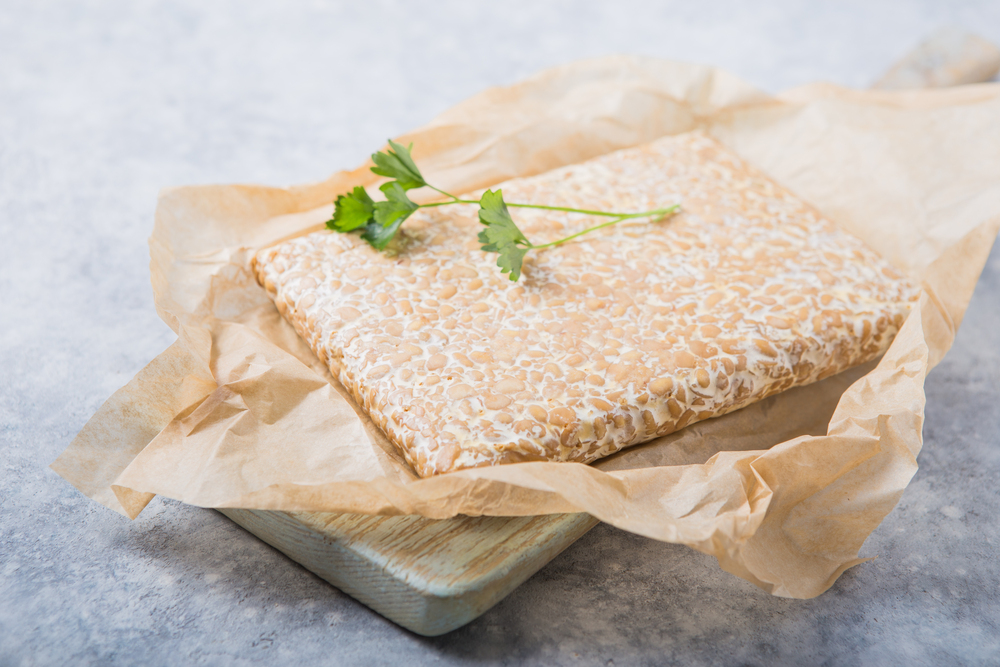Tempe business is a business opportunity with promising prospects. Tempe as a traditional Indonesian food has been around for a long time.
Based on data from the National Standardization Agency (BSN), tempe has existed since the 16th century, especially in Java. This is written in the Fiber Centhini manuscript which mentions the word tempe as a dish called jae santen tempe and kadhele tempe srundengan.
The taste is delicious and the price is affordable, making food made from fermented soybeans popular among all walks of life. This is evidenced by data from the Central Statistics Agency (BPS) for 2021, where per capita consumption of tempeh reaches 0.146 kg/week.
In addition, tempeh is also a food with a high nutritional value. Among other things, it contains fatty acids, minerals, B complex vitamins (vitamins B1, B2, pantothenic acid, nicotinic acid, vitamins B6, and B12), fat-soluble vitamins (Vitamins A, E, and K), as well as antioxidants that can ward off free radicals and inhibit aging.
With the existence of large business opportunities, and high per capita consumption rates, as well as a series of health benefits. Of course, it becomes clear that this business has a great opportunity to bring in lots of profits. Curious about how to start a tempe business and the estimated benefits that can be obtained? Read more in the following information.
Tips for Success in Running a Home-Based Tempeh Business
Indonesia is the largest tempe-producing country in the world as well as the country with the largest soybean market in Asia. This achievement is inseparable from the tips for success in running a tempeh business, especially on a small scale or at home.
So, what are the tips for success? Here are some important points that you must pay attention to so that your homemade tempeh production business can be a great success!
1. Choose Quality Soybeans
In order to produce quality tempeh, the tempe business that you run must use good raw materials. The trick is to choose whole and fresh soybean seeds with characteristics that are not dirty or rotten.
Furthermore, when entering the manufacturing process stage, be sure to sort the soybean seeds first. The trick is to place the soybean seeds in winnowing and then winnowing (separated between good soybean seeds and those with poor quality).
Not only that, but you also have to use yeast which is just as good. Namely, yeast that is still active and when squeezed the yeast does not clump but turns into fine grains.
2. Get Soybeans from a Trusted Supplier
To get good quality soybeans, you can get them from trusted soybean suppliers. Apart from the good quality, by buying from suppliers you can also save more on the budget spent on raw materials for the tempeh business.
On the other hand, you also won't worry about running out of soybeans every day because the supplier you choose will send them according to the agreement that has been made.
Tips for Choosing Suppliers:
- Come directly to the supplier location, check the quality of the existing soybean seeds
- Make visits to several suppliers
- Make a list of the advantages and disadvantages of each supplier (price, quality, delivery distance, etc.)
- Maintain good communication with the supplier you choose
3. Pay attention to the quality of Tempe
The third thing that you should not forget is to pay attention to the quality of your homemade tempeh. Try to produce tempeh with the best quality. Use clean water in a hygienic manner.
In general, there are 5 important factors that need to be considered to produce hygienic tempeh. Among others, namely cleanliness of workers, cleanliness of equipment and production facilities, environmental cleanliness, product cleanliness, packaging, and labeling.
Another tip, make sure the tempeh you produce has a consistent taste. Don't let the flavors change so that buyers are disappointed and switch to other brands of tempeh.
4. Packaging and Labeling
Packaging is not only used as a tool to protect the quality of the tempeh produced. More than that, packaging also has another function that is no less useful, namely as a tool to communicate and promote the products of your homemade tempeh business.
Some of the packages commonly used to wrap tempeh are banana leaves and plastic. On plastic packaging, tempe sellers usually label it with the brand logo and production address. Before labeling, it's a good idea for your business to have a business license from the health office in your area.
The detailed information that is often included on the label is as follows.
- Product brand
- Net weight
- Manufacturer's name and address
- Composition/materials used
- Expired date
- production code
- existing nutritional value
- How to use
- Barcode (if sold in supermarkets)
5. Determine the Selling Price
Tempe has long been known as a food ingredient at affordable prices. Therefore selling tempeh cannot be too expensive. One way you can do to determine the price of one piece of tempe is to do research on the price of tempe on the market.
In addition to the prevailing market prices, you also need to calculate the number of production costs that need to be incurred. This is useful for setting the right price and getting a profit from each piece of tempe sold.
6. Determine the Marketing Strategy
Finally, determine a marketing strategy so that your homemade tempe can sell quickly. How to market tempe products? Here are some ways you can do this.
- Selling on the market
- Collaborate with sellers, restaurants and other businesses that use tempeh as one of their basic ingredients
- Sell online on social media or e-commerce
- Opening a pre-order and reseller system
Before you launch a marketing strategy, it's a good idea to know the unique selling point (USP) of your tempeh business. This is intended so that the tempe offered later can be superior and have its own uniqueness from competitors.
Home Tempe Business Challenges
Starting a tempeh business does not require large capital. Even so, there are some challenges that you must face.
The most common challenge is intense business competition. This is due to the large number of tempe producers spread throughout the region. Thus, it takes a long time and a mature strategy to adapt to the market.
Next is in terms of raw materials and quality of tempeh. To produce tempeh that is of good quality and sells well in the market, you must really understand how to manage it and the right recipe. The reason is, even though processing tempeh is arguably not that complicated if you don't do it carefully, it's not impossible that the results you get can fail.
Even though there are many obstacles that you will face, the home tempeh business opportunity remains a business opportunity with great potential. Moreover, the spread of tempeh is very wide to reach foreign countries.
As quoted from the Jakarta National Standardization Agency (BSN, 2021), the existence of tempe in Europe has been quite popular since 1946. The same data also explains that since 1984 there have been several tempe companies spread across Europe, America, and Japan. Then followed by other countries such as New Zealand, India, Australia, Canada, Mexico, and South Africa.
Tempeh Processing Business Idea
Is the tempeh business profitable? Tempe is a food ingredient that can be processed into anything like ready-to-eat food and has a delicious taste. So, if you are interested in starting a processed tempeh business, you can try the following various business ideas and be able to bring multiple profits.

Image Source: Freepik/tyasindayanti
1. Orek Tempe
Orek tempeh is one of the favorite side dishes of Indonesian families. The texture tends to be wet, and the taste is sweet and even spicy, making anyone fall in love with this processed tempeh food.
Making it is quite easy. You only need to cut the tempeh into small dice then stir-fry it until it smells good with the typical Orek Tempe seasoning.
After that, you can sell them per container with ziplock packaging or clear food containers. The price offered can be adjusted according to the capital and labor you need when making it. Make sure the price remains affordable, okay?
2. Tempeh Chips
Apart from being a side dish, tempeh can also be used as a savory, crunchy snack. For example, namely tempeh chips. There are many types of tempeh chips out there. You can innovate according to creativity and current market demands.
Be sure to make dry tempeh chips with various seasoning variants. This aims to keep the tempeh texture crispy, durable, and your processed tempeh business sells well.
3. Tempeh Nuggets
Tempe nuggets are an alternative food to replace chicken or beef nuggets, especially for those who do not consume animal protein (vegetarians).
If you plan to sell tempeh nuggets, be sure to pay attention to the processed ingredients, packaging, and how to store them so that your processed nuggets are safe for sale outside the city.
4. Tempe Mendoan
The next business idea that is no less popular is tempe mendoan. Tempe mendoan is a fried business that is loved by many people, especially when accompanied with cayenne pepper and a glass of warm tea, of course, the taste will be even more delicious.
Tips for selling tempe mendoan:
- Use the latest or fresh tempeh
- Fried tempe mendoan impromptu (when a buyer comes)
Sobat BFI, here are some business ideas that can increase the profit of your tempeh business. Next, let's look at the estimated capital and profits from selling tempe at home through the calculations below.
Calculation of Initial Capital for Home-Based Tempeh Business
Tempe business is a type of business that includes minimal capital and is easy to run. The following is a calculation of business capital from home-made tempeh within 30 days that you can use as an example.
| Homemade Tempeh Business Capital | ||||
| No. | Item | Quantity | Price Per Quantity | Total |
| 1. | Soybean | 300 | Rp35.300 | Rp10.590.000 |
| 2. | Yeast Tempeh | 400 gram | Rp14.000 | Rp14.000 |
| 3. | LPG | 12 Kg | Rp480.000 | Rp480.000 |
| 4. | Banana Leaves, Unused Newspaper, and Plastic (Tempeh Wrapping) | - | Rp17.000 | Rp510.000 |
| Total | Rp11.594.000 | |||
Next, let's calculate the profit from selling tempe if per day your home-based tempe business is able to produce 1,500 pieces of tempe, sold at Rp. 5,000 per piece and the profit per piece is Rp. 500.
1500 X Rp500 X 30 = 22.500.000
From the results of the calculation above, the gross profit for 30 days or one month is IDR 22,500,000.
As for how to calculate net profit, the existing gross profit is reduced by business capital and operational costs.
Rp22.500.000 - Rp11.594.000 = Rp10.906.000
As a result, the estimated profit of a homemade tempeh business for 30 days is IDR 10,906,000. Very tempting right?
This calculation is not absolute. The results you get may differ from the existing simulation. It all depends on the price of raw materials and other operational costs.
Easy Solution to Get Business Capital
Interested in starting a tempe business but with limited capital? BFI Finance is ready to help you. Apply for a loan at BFI Finance for business needs with a vehicle BPKB collateral loan or house certificate.
The process is safe, and fast, and has been verified by the Financial Services Authority (OJK). To submit, click the following link, yes!
You can get other information regarding loans through the following link.
Loan Information Car BPKB Guarantee
Disbursement of funds up to 85% of the vehicle value and a tenor of up to 3 years.
Loan Information BPKB Motor Guarantee
Loan funds with a fast process and a maximum tenor of up to 18 months.
Loan Information Home Certificate Guarantee
Low interest starts from 0.9% with a long tenor of up to 48 months.
Sobat BFI, that's brief information about the home-made tempeh business. Don't hesitate to start this business because the opportunities are still very wide open with a wide market share.
Look forward to other interesting articles only on the BFI Blog. Updates every Monday-Friday!







